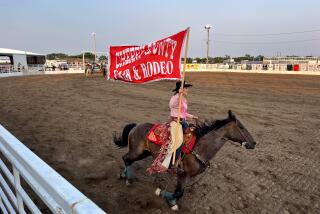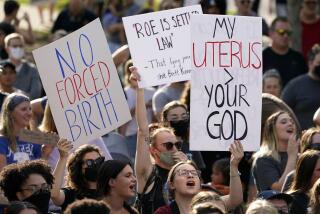Harkin Scores Record Victory in Iowa Caucus
- Share via
DES MOINES — Campaigning all alone in the state where he has lived for 52 years, Iowa Sen. Tom Harkin scored a landslide victory Monday in the first electoral contest of the 1992 presidential race.
As he promised, Harkin did better in Iowa’s Democratic caucuses than any presidential candidate has ever done. He even exceeded former President Jimmy Carter’s record of 59% in 1980. But the significance of his victory was limited because he faced almost no opposition.
With 91.2% of the precincts reporting, Harkin had 76.7% of the delegates selected at the 2,189 precinct caucuses. Monday night’s contest was the first in a four-step process to select Iowa’s 49 delegates to the Democratic National Convention, where 2,144 delegates are required for nomination. Delegates can change their minds anywhere along the line.
Harkin’s nearest competition was “uncommitted,” with 12%.
“Tonight you fired the shot that is going to be heard around this country and around the world,” a jubilant Harkin told cheering supporters gathered at a Des Moines hotel. “I want you to know this campaign is on track, the train is on time and this engine has a full head of steam. Tonight we here in Iowa showed them how we do it. Now we take it to the rest of the country.”
His four major opponents virtually ignored the state--and caucus-goers virtually ignored them. Former Massachusetts Sen. Paul E. Tsongas, who made a last-minute pitch for votes in Iowa by opening an office in Des Moines last Friday and mailing 18,000 campaign letters, was the second-ranked candidate with just 4%.
He was followed by Arkansas Gov. Bill Clinton with 2.9%, Nebraska Sen. Bob Kerrey with 2.2% and former California Gov. Edmund G. (Jerry) Brown Jr. with 1.5%.
The turnout was low, even for a caucus. No more than 25,000 of Iowa’s 580,000 registered Democrats were estimated to have attended, or about 4% of those eligible. By contrast, 120,000, or 20%, attended in 1988.
Despite Harkin’s victory, he is not expected to benefit from the traditional “Iowa bump” that winning candidates often get as they head from the caucuses into the New Hampshire primary a week from today. With nobody else campaigning in the state, Harkin had been expected to win big. As a result, these are the first Iowa caucuses in 20 years that are expected to have little effect on the presidential race.
Harkin, 52, spent the last weekend campaigning hard in Iowa’s big and small towns, reminding his supporters that it is still important for them to attend their caucuses. “I think there’s a lot of people out there who say, ‘Ah, Harkin’s going to win, what the heck, why do we have to go there?’ ” he told a cheering Des Moines audience over the weekend. “But I need a strong showing Monday night. I need you at those caucuses--and bring your friends.”
Winter did nothing to hinder the event. The weather was good for the season--Sunday’s snow melted during the day Monday, and temperatures hovered around 30.
But the caucus process itself discourages turnout. Unlike a primary, in which a voter can cast a ballot secretly and quickly, caucus-goers must make their stand in front of friends and neighbors. Democrats gather at neighborhood firehouses, churches and schoolrooms. They “vote” by standing in the area of the room designated for their candidate. The public nature of the process can lead to debates, pressure and intimidation.
Caucus rules require that supporters of any candidate who is not chosen by at least 15% of those present must disband and join another group. So, Harkin’s opponents said earlier, their supporters might be deterred from participating because their effort could be worthless.
“We don’t want to put them through that,” said Craig Smith, Clinton’s deputy campaign manager. “It’s very hard in a public forum such as a caucus to stand up and say, ‘I’m not for the hometown boy.’ ”
Harkin campaign manager Tim Raftis argued that his candidate should get a boost from winning in Iowa because it is an affirmation from his home-state voters, whom he described as very independent and well aware of the other campaigns.
“You have to ask for their support for President,” he said. “This is not machine politics.”
Precisely because the road to New Hampshire did not run through Iowa this year, the Democratic contest in 1992 differs significantly from any in the last 20 years.
Four years ago, for example, a little known Midwesterner--Missouri Rep. Richard A. Gephardt--staked his presidential hopes on a toughly worded television commercial that bashed Korea for allegedly closing its markets to U.S. products. It helped him win the first vote of the year--Iowa.
This year, another little-known Midwesterner--Nebraska Sen. Bob Kerrey--used a toughly worded television commercial in which he bashed Japan for allegedly closing its markets to U.S. products. But Kerrey’s ad aired in New Hampshire, and his poll numbers slumped noticeably after it aired. Eventually even the candidate dubbed it a “mistake.”
That illustrates the differences between Iowa and New Hampshire--and the differences in this year’s campaign. Iowa’s relatively strong union movement and heartland tradition of insularity provides a sympathetic audience for protectionism. In New Hampshire, union members are almost as rare as an early thaw, and a Yankee trading tradition still dilutes the urge to close markets.
“If we had been running the ad in Iowa it might have had a different impact,” said Harrison Hickman, Kerrey’s pollster.
But if Iowa’s presence is not being felt in the Democratic race, its absence is. For the Democratic contenders, Iowa’s devaluation has already changed the nature of their debate--and so heightened New Hampshire’s importance that the results in next Tuesday’s primary could cripple a majority of the field.
In some respects Iowa and New Hampshire are similar staging grounds. Demographically these two small states are equally unrepresentative in their homogeneity: Iowa is 97% white, New Hampshire 98%.
But, analysts say, the party activists who turn out for the Iowa caucuses tend to be more liberal than the New Hampshire primary electorate--which includes independents as well as registered Democrats. That ideological gap is reinforced by the inherent difference between campaigning in caucus and primary states.
Because a caucus state puts a premium on organization, the Democratic candidates in 1988 devoted enormous energy to wooing Iowa groups that claimed the muscle to turn out voters. That magnified the impact of unions, environmentalists and peace groups--organizations that have generally tried to hold the line against deviations in traditional Democratic approaches.
Because they have not had to woo those Iowa constituencies this time, analysts say, the Democratic candidates have had more freedom to deviate from party orthodoxy.
“Iowa drives the litmus test approach to our nomination,” says Democratic strategist Brian Lunde, who ran Illinois Sen. Paul Simon’s 1988 presidential campaign. “That approach clearly has a lot less power in New Hampshire.”
That has probably most helped Clinton. Many Democrats say the Arkansas governor, who has largely built his campaign on a re-examination of historic Democratic approaches, would likely have felt much more pressure to soften his heresies in the barns of Iowa than he has in the living rooms of New Hampshire.
The elimination of Iowa as a serious contest has changed the race in other respects. Not only is Iowa more protectionist and keener about agricultural issues than New Hampshire, but its strong network of peace activists has demanded the candidates debate the most abstruse dimensions of arms control and foreign policy.
New Hampshire’s priorities have forced the candidates to address economic concerns to the exclusion of virtually everything else. “Finally we’ve gotten the political process back to the issues that are important in people’s lives,” says Frank Greer, Clinton’s media adviser.
The effective removal of Iowa from the calendar could change the race’s strategic environment even more fundamentally. In the past, New Hampshire has provided a second chance for eventual nominees who stumbled out of the gate in Iowa, such as Ronald Reagan in 1980, and both George Bush and Michael S. Dukakis in 1988.
Now, with money tight for all the contenders, many Democratic analysts believe that several of the candidates face the grim prospect of being effectively eliminated from the race with a poor showing in New Hampshire.
Because the calendar quickly turns toward his native South, Clinton has at least the potential to bounce back from a disappointing finish, most observers believe. That’s not necessarily true for Kerrey, Harkin, Tsongas or Brown. If Clinton can surmount the controversies surrounding his personal life to win a convincing victory in New Hampshire next week, many analysts believe, the Democratic race could be virtually decided, unless a late entrant joins the field.
That creates a possibility disturbing to many party insiders: Although the Democrats have resolutely refused to create a national primary in their quadrennial tinkering with party rules, Harkin’s candidacy has created the circumstances in which New Hampshire could function as just that.
“The irony is that the senator from Iowa could basically give us a national primary in New Hampshire,” says Democratic strategist Bill Carrick.
Monday’s caucuses also established one little-noticed landmark. It was the first time that post-Vietnam War babies were eligible to vote for President. Since Iowa’s rules allow youths who will turn 18 by November to participate in a caucus, the youngest voters were born on Nov. 3, 1974, three months after President Richard M. Nixon resigned from office.
With such different political references in their lives, what are the issues influencing the decisions of these new voters? It’s jobs.
Dana Jensen, a 21-year-old senior at the University of Iowa who is a student Democratic leader, said two of her friends graduated a year ago with masters degrees and are both still unemployed.
“My whole generation is going to be lost and we’re definitely not going to be as well off as our parents,” she said. “It is a very big issue. It is a very big crisis.”
Republicans chose to wait to test Patrick J. Buchanan’s conservative challenge to President Bush. The Iowa GOP canceled its traditional presidential preference poll, leaving New Hampshire to go first.
Lesher reported from Des Moines and Brownstein from Manchester, N.H.
The Iowa Vote
Democrats
Tom Harkin: 76.7%
Uncommitted: 12.0%
Paul E. Tsongas: 4.0%
Bill Clinton: 2.9%
Bob Kerrey: 2.2%
Jerry Brown: 1.5%
The Turnout
* The Democrats estimated that 25,000 voters had attended the caucuses, which is about 4% of the party’s registered voters in the state. That’s a dramatic drop from 1988, when 120,000, or 20%, came.
Republicans
* The Iowa Republican Party canceled its traditional straw poll of caucus-goers because neither of President Bush’s challengers, Patrick J. Buchanan or David Duke, planned to campaign in the state this year. Republicans chose delegates who did not have to state a presidential preference, but they are virtually certain to support Bush.
Source: Times staff and wire reports
More to Read
Get the L.A. Times Politics newsletter
Deeply reported insights into legislation, politics and policy from Sacramento, Washington and beyond. In your inbox twice per week.
You may occasionally receive promotional content from the Los Angeles Times.










